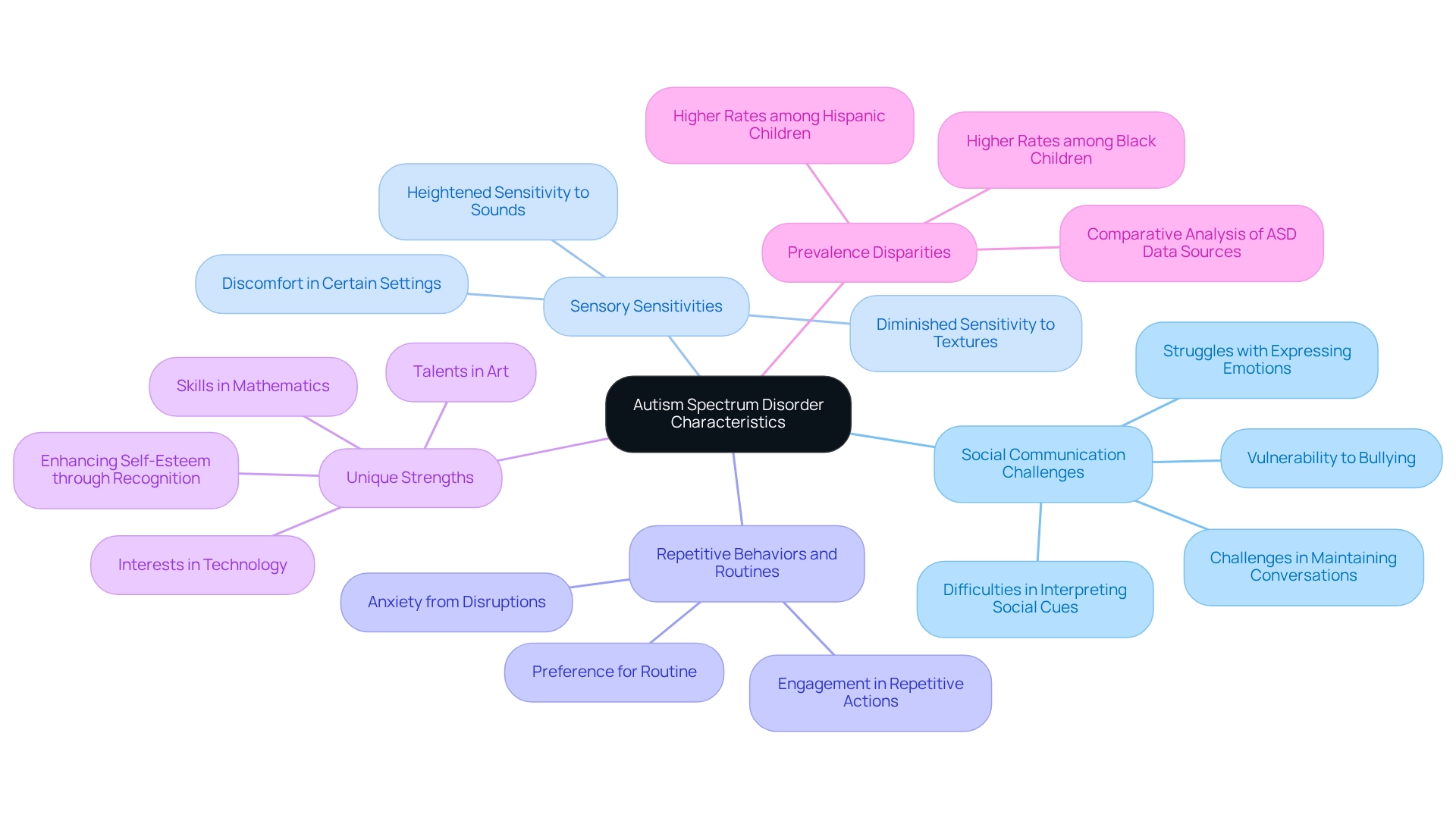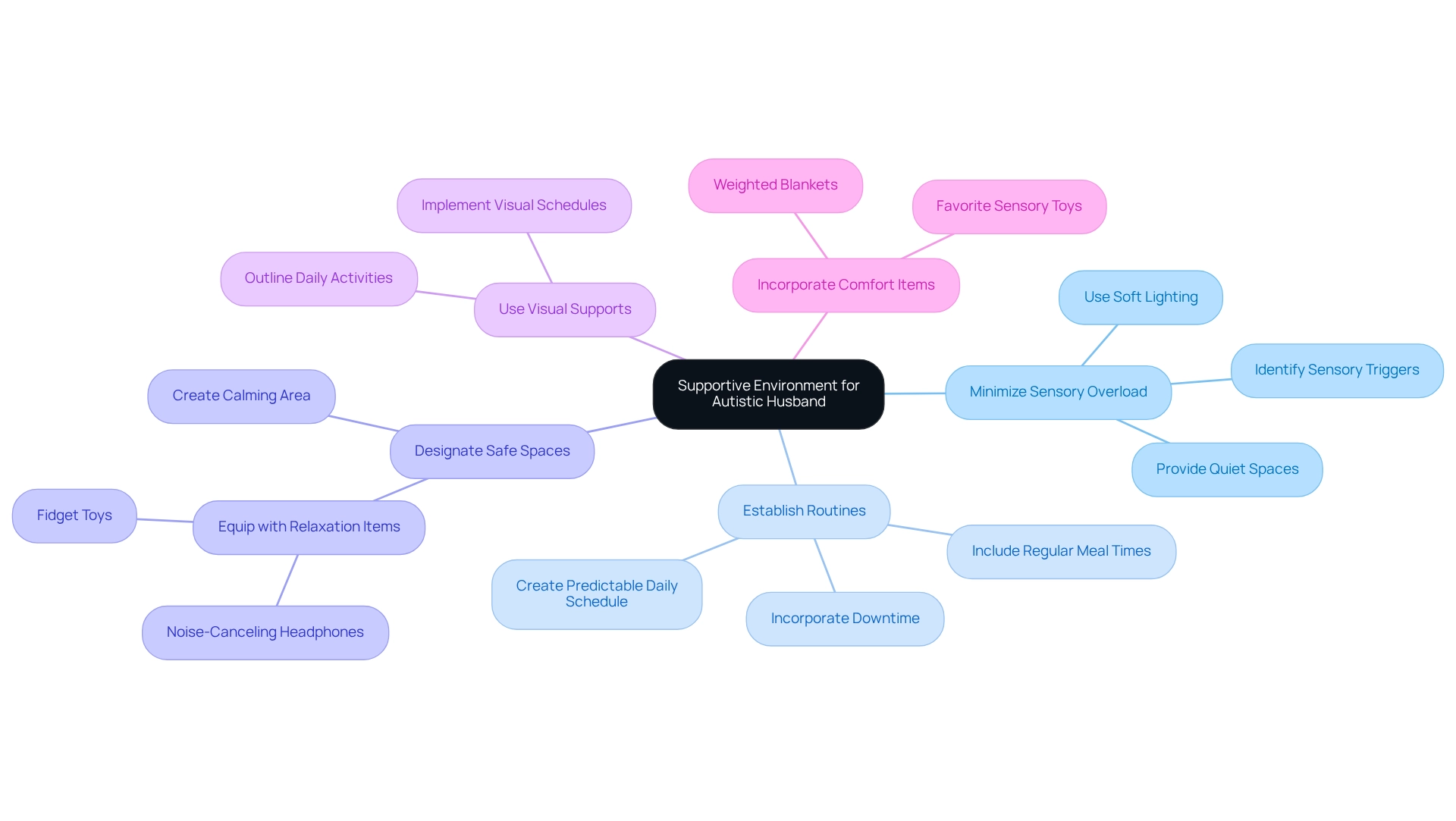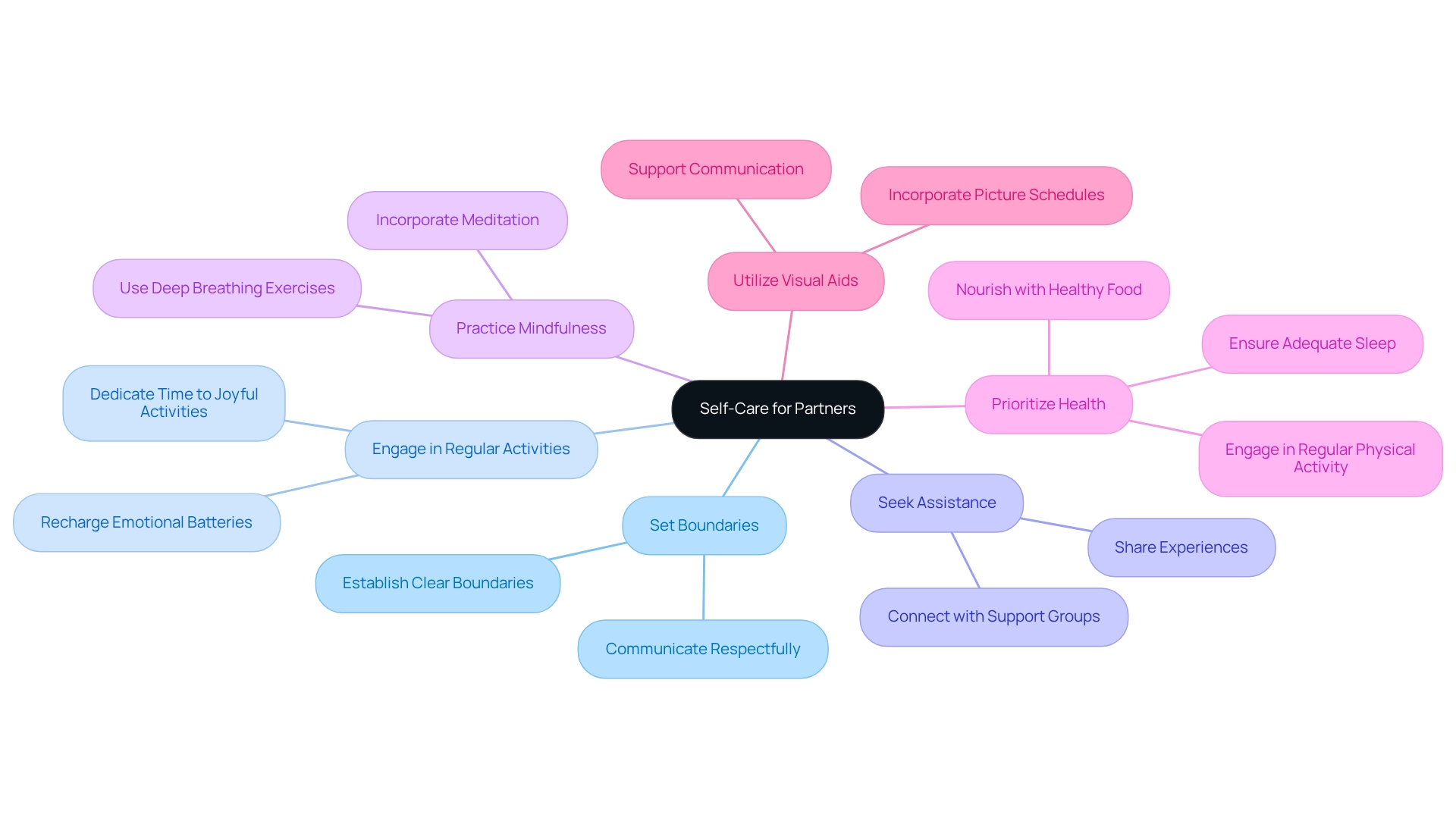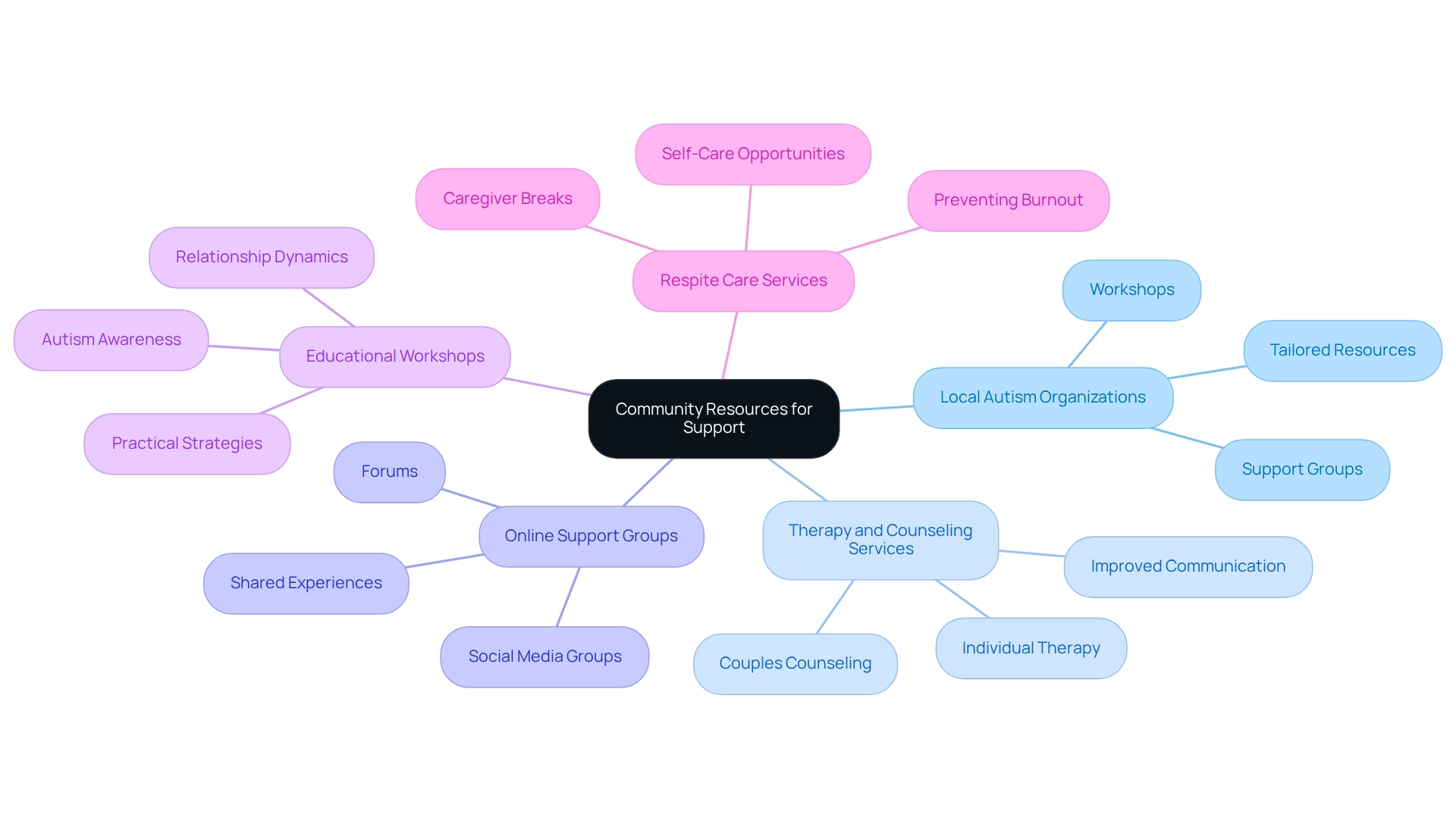Overview
Supporting your autistic husband requires a compassionate understanding of autism's unique characteristics. It's essential to communicate clearly and create a nurturing home environment that prioritizes both your well-being and his. By minimizing sensory overload and fostering tailored communication, you can significantly enhance his quality of life. Additionally, building a strong support network is vital.
This article offers specific strategies for each of these areas, aiming to provide you with the insights you need. Consider how these approaches can be applied in your daily life. What challenges have you faced, and how can these strategies help? Remember, seeking external resources is a sign of strength, not weakness. Together, you can navigate this journey with love and understanding.
Introduction
Navigating the complexities of a relationship with an autistic partner can be both rewarding and challenging. It’s important to understand autism spectrum disorder (ASD) to create a nurturing and supportive environment. By recognizing social communication hurdles and sensory sensitivities, while also embracing unique strengths, you can lay the groundwork for effective connection.
This article explores practical strategies that enhance communication, foster a supportive home atmosphere, prioritize self-care, and encourage seeking external resources. Equip yourself with knowledge and tools to cultivate a deeper understanding and a stronger bond, enriching your shared journey together.
Understand Autism: Key Characteristics and Challenges
To effectively support your autistic husband, it is essential to understand the key characteristics of autism spectrum disorder (ASD). Autism manifests in various forms, and recognizing these can help you provide the best support possible.
Social Communication Challenges: Individuals on the autism spectrum often face difficulties in interpreting social cues, maintaining conversations, and expressing emotions. They may prefer straightforward communication and can struggle to recognize nonverbal signals, such as facial expressions or tone of voice. Recent studies indicate that these social communication challenges significantly impact their interactions and relationships. It's important to note that children on the spectrum are particularly vulnerable to bullying, highlighting the need for nurturing social environments.
Sensory Sensitivities: Many autistic individuals experience heightened or diminished sensitivity to sensory inputs, such as sounds, lights, and textures. This sensitivity can lead to discomfort in certain settings, making it vital to create a supportive environment that accommodates their sensory needs.
Repetitive Behaviors and Routines: A preference for routine is common among autistic people, who may engage in repetitive actions or interests. Disruptions to their established routines can cause anxiety or distress, emphasizing the importance of consistency in their daily lives.
Unique Strengths: Autistic individuals often possess remarkable skills or interests in specific areas, including mathematics, art, or technology. Recognizing and nurturing these strengths can significantly enhance their self-esteem and engagement, fostering a positive atmosphere for personal growth. A comparative analysis of ASD data sources reveals that understanding the various methodologies for estimating ASD prevalence is crucial for appreciating these strengths across different demographics. By familiarizing yourself with these characteristics of your autistic husband, you can gain deeper insights into his experiences and needs, ultimately paving the way for more effective support. As highlighted by the CDC, disparities in ASD prevalence exist among different racial and ethnic groups, with higher rates observed among Hispanic and Black children compared to their White counterparts. This context is vital for understanding the broader challenges faced by individuals on the autism spectrum.

Communicate Effectively: Tailored Strategies for Connection
To foster effective communication with your autistic husband, consider these compassionate strategies:
- Be Direct and Clear: Use straightforward language, steering clear of idioms or metaphors that might lead to confusion. For example, instead of saying "It's raining cats and dogs," simply state, "It's raining heavily."
- Allow Processing Time: After posing a question or making a statement, give your autistic husband the time he needs to process the information. He may require a moment to formulate his response, which is essential for meaningful dialogue.
- Use Visual Supports: Incorporate visual aids, such as charts or written instructions, to complement verbal communication. This approach not only clarifies expectations but also alleviates anxiety, making interactions smoother. Research indicates that visual aids can significantly enhance comprehension for autistic individuals.
- Check for Understanding: Engage your autistic husband with open-ended questions to confirm his understanding. For instance, you might ask, "Can you share your thoughts on this plan?" This encourages him to express his views and ensures clarity.
- Practice Active Listening: Show that you value his input through attentive listening and thoughtful responses. This practice cultivates a comfortable environment for him to share his thoughts and feelings, reinforcing the bond between you.
In the context of relationships, it's noteworthy that the average age for marriage among individuals with autism is around 20 years old, underscoring the significance of effective communication in nurturing strong partnerships. Additionally, the average cost of therapeutic behavioral services in the U.S. is $175.44, highlighting the financial considerations that may accompany seeking support for communication strategies.
Implementing these strategies can create a supportive communication environment that honors your autistic husband's unique needs, ultimately enhancing your relationship and mutual understanding. As illustrated in the case study 'Inspiring Quotes from People with Autism,' effective communication can empower individuals with autism to express their thoughts and emotions, showcasing their resilience and strength.
Create a Supportive Environment: Practical Adjustments at Home
Creating a supportive home environment for your autistic husband is a journey that is filled with love and understanding. Here are some thoughtful adjustments to consider:
- Minimize Sensory Overload: Begin by identifying and reducing sensory triggers in your home. This could mean using soft lighting, minimizing loud noises, and providing quiet spaces for relaxation. Specialists emphasize that establishing a sensory-friendly setting is crucial, as approximately 70-90% of individuals with autism experience significant sensory processing challenges.
- Establish Routines: Craft a predictable daily schedule that includes regular meal times, activities, and downtime. This structure can help your autistic husband feel more secure and alleviate his anxiety. Occupational therapists note that predictability in daily routines can greatly reduce anxiety levels for autistic individuals.
- Designate Safe Spaces: Create a specific area in your home where he can retreat when feeling overwhelmed. This calming space should be equipped with items that promote relaxation, such as noise-canceling headphones or fidget toys. Insights from the case study "Managing Meltdowns in Children: A Comprehensive Guide" highlight the importance of safe spaces in managing emotional distress.
- Use Visual Supports: Implement visual schedules or charts to outline daily activities and expectations. This approach can help him understand what to expect, minimizing anxiety related to transitions. Visual aids are particularly effective in easing the anxiety associated with changes in routine.
- Incorporate Comfort Items: Allow him to have personal items that provide comfort, such as weighted blankets or favorite sensory toys, within easy reach. These items can significantly contribute to creating a nurturing environment that fosters emotional regulation.
By embracing these adjustments, you can cultivate a nurturing environment that supports your autistic husband's unique needs and enhances his overall well-being.

Prioritize Self-Care: Maintain Your Well-Being as a Partner
To nurture your well-being as a partner to an autistic individual, consider embracing the following self-care strategies:
- Set Boundaries: Establish clear boundaries to safeguard your personal time and space. Communicate these boundaries to your partner respectfully, fostering a mutual understanding that strengthens your relationship.
- Engage in Regular Activities: Dedicate time to activities that bring you joy, whether it’s reading, exercising, or spending time with friends. This practice can help recharge your emotional batteries, allowing you to be more present.
- Seek Assistance: Connect with other partners of autistic individuals through support groups or online forums. Sharing your experiences can provide valuable insights and emotional relief, reinforcing a sense of community that is so vital.
- Practice Mindfulness: Incorporate mindfulness techniques, such as meditation or deep breathing exercises, into your daily routine. These practices can help reduce stress and enhance your emotional resilience.
- Prioritize Health: Ensure you are nourishing your body with healthy food, getting adequate sleep, and engaging in regular physical activity. Your physical well-being directly influences your capacity to support your partner effectively.
- Utilize Visual Aids: Consider incorporating visual aids like picture schedules to improve communication and understanding. This approach can support both your self-care efforts and your partner's needs.
As Chi expressed about meltdowns, "I feel trapped. I have a weird tension in my head or my arms I want to get out... Whenever that happens I end up hurting someone or confusing everyone." Recognizing these emotional challenges can significantly enhance your ability to navigate your relationship with compassion and understanding.
By prioritizing your self-care, you can cultivate a healthier relationship dynamic and be more present for your partner. This focus ultimately enhances both your well-being and the quality of your partnership. Moreover, embracing the concept of neurodiversity, as highlighted in the case study 'Embracing Neurodiversity,' can shift your perspective towards appreciating the unique talents of individuals on the autism spectrum.

Seek External Support: Engage with Community Resources
To enhance your support network, consider engaging with the following community resources that can truly make a difference:
- Local Autism Organizations: Connecting with local autism organizations can provide you with invaluable support groups, workshops, and tailored resources specifically designed for partners of autistic individuals. These organizations foster a sense of community and offer valuable information, which is essential. It's important to note that ASD prevalence has been consistently higher among boys than girls, highlighting the need for targeted support.
- Therapy and Counseling Services: Seeking therapy or counseling, whether individually or as a couple, can be incredibly beneficial. Professional guidance helps navigate challenges and improves communication—crucial elements for maintaining healthy relationships. Given that the average costs of common autism services in the U.S. can be significant, accessing community resources becomes essential.
- Online Support Groups: Joining online forums or social media groups specifically for partners of autistic individuals can create a nurturing space for sharing experiences and gaining insights from others facing similar challenges. These connections can be incredibly supportive.
- Educational Workshops: Attending workshops focused on autism awareness and relationship dynamics can provide practical strategies and deepen your understanding of autism. This knowledge can significantly enhance your relationship and foster a more supportive environment.
- Respite Care Services: Exploring respite care options allows you to take necessary breaks while ensuring your spouse is well cared for. This assistance is vital in preventing caregiver burnout and providing essential time for self-care.
By actively seeking outside assistance, you can build a robust network that enhances both your well-being and the quality of life of your autistic husband. Statistics indicate that 5% of all students in the U.S. do not finish high school, underscoring the importance of community resources in supporting families. Furthermore, local autism organizations play a critical role in improving access to services, as evidenced by data collected from over 5 million children annually, highlighting their profound impact on the community. As noted by Autism Speaks, "The data can also benefit families, improving awareness of and access to services and support programs in their state.

Conclusion
Supporting an autistic partner is a journey that requires empathy, communication, and a nurturing environment. By recognizing the unique characteristics of autism spectrum disorder—like social communication challenges, sensory sensitivities, and the significance of routines—partners can navigate the complexities of their relationship with greater ease. Clear and direct communication, allowing for processing time, and using visual supports are essential strategies that foster meaningful connections.
Equally vital is the creation of a supportive home environment. Reducing sensory overload, establishing predictable routines, and incorporating comfort items can greatly enhance emotional well-being. It’s important for partners to prioritize their own self-care, setting boundaries, engaging in enjoyable activities, and seeking support from communities and resources dedicated to autism awareness.
Ultimately, the path of supporting an autistic partner is enriched through understanding, patience, and proactive engagement with both the individual and external resources. By embracing these strategies, partners can cultivate a nurturing atmosphere that not only strengthens their bond but also celebrates the unique strengths and perspectives that individuals on the autism spectrum bring to the relationship. While the journey may have its challenges, the rewards of deeper understanding and connection are profound, leading to a fulfilling shared life together.
Frequently Asked Questions
What are the key characteristics of autism spectrum disorder (ASD)?
Key characteristics of ASD include social communication challenges, sensory sensitivities, a preference for routines and repetitive behaviors, and unique strengths in specific areas such as mathematics or art.
What social communication challenges do individuals with autism face?
Individuals with autism often struggle with interpreting social cues, maintaining conversations, and expressing emotions. They may prefer straightforward communication and find it difficult to recognize nonverbal signals like facial expressions or tone of voice.
How do sensory sensitivities affect autistic individuals?
Many autistic individuals experience heightened or diminished sensitivity to sensory inputs, such as sounds, lights, and textures. This can lead to discomfort in certain environments, making it important to create supportive spaces that accommodate their sensory needs.
Why is routine important for individuals with autism?
Autistic individuals often prefer routines and may engage in repetitive actions or interests. Disruptions to their established routines can cause anxiety or distress, highlighting the importance of consistency in their daily lives.
What are some unique strengths of autistic individuals?
Autistic individuals often have remarkable skills or interests in specific areas, including mathematics, art, or technology. Recognizing and nurturing these strengths can enhance their self-esteem and engagement.
What strategies can help improve communication with an autistic husband?
Effective strategies include using direct and clear language, allowing processing time, incorporating visual supports, checking for understanding, and practicing active listening.
Why is it important to use direct and clear language when communicating with an autistic husband?
Direct and clear language helps avoid confusion that may arise from idioms or metaphors, making it easier for the individual to understand the message.
How can visual supports aid communication with autistic individuals?
Visual aids, such as charts or written instructions, can clarify expectations and alleviate anxiety, significantly enhancing comprehension for autistic individuals.
What is the average age for marriage among individuals with autism?
The average age for marriage among individuals with autism is around 20 years old.
What is the average cost of therapeutic behavioral services in the U.S.?
The average cost of therapeutic behavioral services in the U.S. is approximately $175.44.




